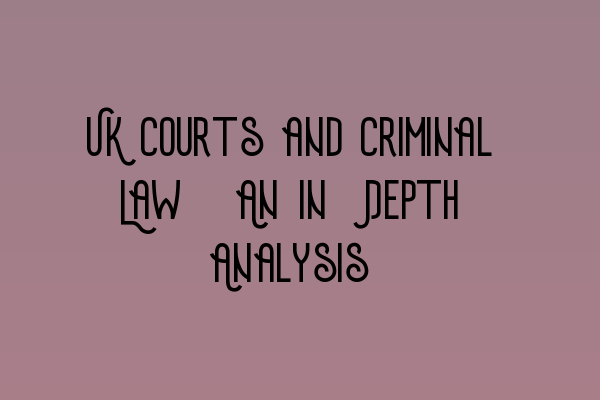UK Courts and Criminal Law: An In-Depth Analysis
Welcome to SQE Criminal Law & Practice Law UK! In this comprehensive blog post, we will delve into the intricate workings of the UK courts and criminal law. Understanding the legal system is crucial for anyone interested in pursuing a career in law or seeking legal advice. So, let’s explore!
Overview of the UK Courts
The UK courts play a vital role in the administration of justice. They ensure that those who engage in criminal activities are held accountable for their actions. The court system in the UK is structured hierarchically and consists of various levels, including the Magistrates’ Court, the Crown Court, and the Supreme Court.
The Magistrates’ Court, often referred to as the lower court, deals with less serious criminal cases. It is presided over by magistrates who are trained non-professional judges.
For more serious offenses and trials, the Crown Court comes into play. This court consists of professional judges and is responsible for handling indictable offenses. Here, trials are conducted in front of a jury, and the judges provide guidance on the law.
The final authority in the UK court system is the Supreme Court. This highest court of appeal ensures the uniform interpretation of the law and resolves legal disputes of significant public importance.
The Criminal Law Framework
Criminal law refers to the body of law that deals with crimes committed against the public. It sets out the rights and responsibilities of individuals within society and specifies the punishments for unlawful behavior.
One of the fundamental principles in criminal law is the presumption of innocence. It means that every individual is considered innocent until proven guilty beyond a reasonable doubt. This principle is crucial in maintaining a fair and just legal system.
The criminal law framework encompasses various offenses, ranging from minor infractions to serious crimes. Offenses can be categorized as either summary offenses (triable in a Magistrates’ Court) or indictable offenses (requiring trial in the Crown Court).
To better understand the intricacies of criminal law, it is important to have a solid foundation in legal training. If you’re preparing for the SQE 1 exams and seeking to enhance your knowledge in criminal law, consider enrolling in our comprehensive SQE 1 preparation courses.
Conclusion
Understanding the UK courts and criminal law framework is essential for anyone with an interest in the legal system. Whether you’re a law student, aspiring lawyer, or simply seeking legal advice, familiarity with these topics is invaluable.
At SQE Criminal Law & Practice Law UK, we are dedicated to providing comprehensive legal resources and top-notch preparation for the SQE 2 exams. Stay tuned for more in-depth analyses of legal topics to further enhance your understanding of the law.
